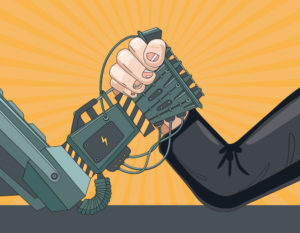In the 90’s the advent of technology, in particular the internet and MP3 services, would disrupt the music industry, leading to, not only new formats to enjoy music in, but to decreased album sales. Innovations in technology and the development of the internet has worried lawyers and the legal field. Lawyers, like everyone else, continue to question whether robots will replace their jobs. Thus, The Barhas been stagnant in its response and use of technology. However, slowly, automation is doing the job.
Two articles stuck out to me in my research—a 2013 article called, “The Laws of (Legal) Robotics: Automatons, Apis, and the Aba,” by Tim Hwang & a 2017 New York Times article, “A.I. Is Doing Legal Work. But It Won’t Replace Lawyers, Yet” by Steve Lohr. Hwang’s article discussed the developing legal technology and the resulting economic and the legal implications. In particular, although automation and technology can displace the need for a lawyer, it can be used to supplant tedious and rudimentary job requirements, such as document reviewing. This is software which, for example, “replaces the cumbersome manual filling in of repetitive documents with template-based systems where the user answers software-driven interview questions” (i.e. E-discovery and Axiom). However, automated document assembly technology has led to big business, with some of this supplanting the lawyer altogether, not just aspects of crafting the work product (LegalZoom). This is what lawyers were concerned with. Only lawyers can participate in the practice of lawand lawyers remain resistant to automation and artificial intelligence in part, because of this requirement, however automation has already taken advantage of its ambiguities. The practice of law as it defined by the law has been challenged by these technologies and the difficultly of cleanly delineating which tasks are permissible for automation will only increase as more technology develops.
Lohr’s article details the development of automation, declaring that the adoption of artificial technology in law firms will be a “slow, task-by-task process.” What this process may look like istechnology automating pieces of the work, streamlining the rest of the work. Currently, portions ofbasic document review have already been outsourced or automated at large law firms. Thus, under this view, technology and automation assisting human work rather than replacing it. The work that consumes most lawyer’s time still involves “strategy, creativity, judgment and empathy” — and those efforts cannot yet be automated. However, lawyers need to remain cognizant that technology and the accompanying innovations are unpredictable.
Now back to my music industry analogy – Today, as streaming services dominant the field, money is being transferred from the industry execs to independent labels and artist. Thus, as a very intelligent professor (Professor Hollis) once stated, either you adapt to this need and changes, and benefit from technology, or other/new players will come along and supply this and force you out of the picture altogether. As Daniel Domingo stated in his blog, The Big Four Accounting firms are already planning to insource and automate some legal work. Ultimately, disruptive change will happen, and although there are human qualities necessary to the field of law that preserve the demand for lawyers, technology is beginning to tread in this domain. One thing Hwang’s article indicated was that “if the technology is not sufficiently capable to replace at least some of the tasks done by lawyers, there will be no adoption.” Thus, ultimately, the technology that will challenge the lawyer’s job will be of optimal quality, and thus as the Innovator’s Dilemma reveals, in the end efficiency and competence in the legal field will be furthered.
Questions:
- What legal services and jobs are at risk with the development of automation and artificial technology in the legal field?
- Are there any new legal services and jobs that can development with the advent of technology and automation?
